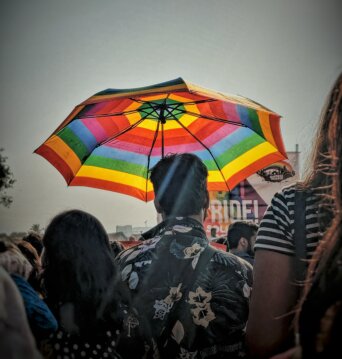- About
- Topics
- Picks
- Audio
- Story
- In-Depth
- Opinion
- News
- Donate
- Signup for our newsletterOur Editors' Best Picks.Send
Read, Debate: Engage.
| topic: | LGBT Rights |
|---|---|
| located: | Bosnia and Herzegovina |
| editor: | Katarina Panić |
“The great victory of activism,” read the headlines this week in Bosnia and Herzegovina (BiH).
The first-ever Bosnian Pride Parade took place two years ago, and organisers were forced to pay additional security costs, as requested by the authorities. The costs included medical insurance and physical insurance of private security guards, as well as concrete blocks and metal fences. International donations supported the community at that time in order to bridge the gap in the budget.
Ever since, they have been campaigning for the state to pay the costs for their safety instead of the organisers themselves, especially considering that no other public gatherings but LGBTQ+ ones have been forced to do so. Furthermore, they stress, the state is obliged to fully protect its citizens in public meetings even when they protest against the authorities.
"We have won several extremely important victories regarding the attitude of BiH institutions towards public gatherings, especially LGBTIQ,” stated the organisers of the pride parade on Monday.
“Namely, our request that competent institutions ensure the complete security of Pride processions and cover the costs of additional security measures was supported by the Prime Minister of Sarajevo, Canton Edin Forto, the Mayor of Centar Sarajevo municipality, Srđan Mandić, and the Mayor of Sarajevo city, Benjamina Karić,” they added.
They further stated that this is a great victory for activists over institutions in the struggle for human rights and freedom of assembly. This year's pride parade will take place on Saturday 14 August under the motto "Resistance from the margin."
It is still a high-risk public gathering that is often followed by several counter-protests organised by right-wing activists. However, it is a less tense situation for the organisers, knowing the state entirely took over the responsibility over its citizens’ safety.
Besides BiH, another south-eastern European state improved its LGBTQ+ rights recently. Conservative Montenegro registered the first same-sex marriage last month.
Unlike these non-European Union countries, the EU member state Hungary has made things worse for the queer community once again, as it has repeatedly moved towards social and institutionalised homophobia. Just recently, it forbade the sale of any books or media depicting same-sex relations or gender changes within 200 meters of any school or church.
Image: Divya Jain.

